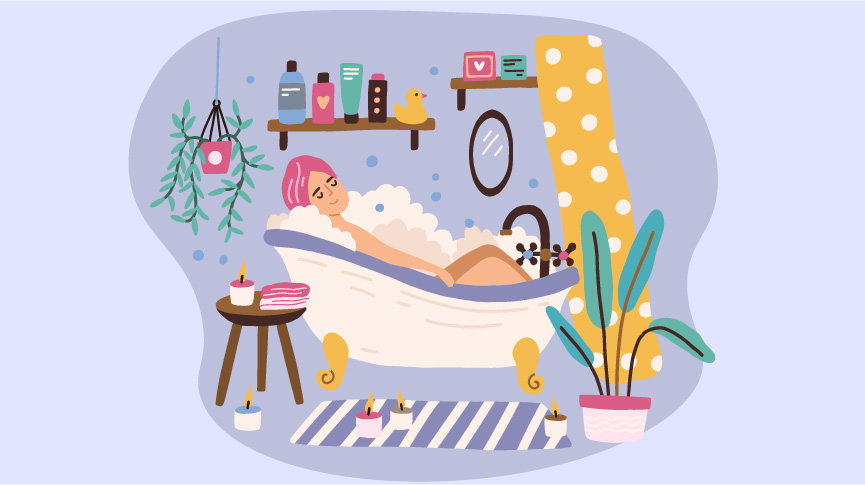Happy Hormones: What are They, and How Do They Work?

Ahh, that feel-good rush after you hug a loved one, take a walk in fresh air, or maybe even have an orgasm.
Happiness is essential to our well-being. Happiness is a cue that we’re not only surviving on this planet but thriving.
But just how does happiness work? What is the biological process that happens when we feel good or happy?
Let’s find out.
Hormones and Neurotransmitters
Hormones are the nifty chemical messengers that tell our systems what to do, and when. They are secreted by the endocrine system, a complex network of glands that help produce, regulate, and release hormones.
The main chemicals that help contribute to our happiness are serotonin, oxytocin, endorphins, and dopamine. While all three of these chemicals help us feel good, they work in different ways.
It’s not just hormones however that help makes us feel good. Neurotransmitters are another type of chemical messenger that help control bodily functions as well as mental processes, by helping the nervous system communicate.
When it comes down to it, both hormones and neurotransmitters are chemical messengers, the main difference being that hormones travel through the bloodstream and neurotransmitters work in the brain and central nervous system.
Who Are These Happy Hormones?
These happy hormones seem to have been given the best gig in the body, but just who are they, and what individual roles do they play in our wellbeing?
Let’s get to know them!
Dopamine: This hormone is pretty dope if we do say so ourselves. You know that rush you get from accomplishing something or crossing a task off of your to-do list? That’s thanks to dopamine.
Dopamine works on our rewards system by making us feel good when we perceive a positive stimulus. It also helps with alertness and attention, impulse control and decision making, motivation and memory, motor control, and cognitive function.
This hormone also plays a huge role in addiction, Parkinson’s disease, and schizophrenia.
Oxytocin: Commonly known as “the love hormone”, oxytocin needs no introduction. This feel-good chemical helps ease the nervous system, promote bonding and feelings of trust, improve stress responses, and promote feelings of love! It also plays a key role in birth and lactation. It even helps with immune health and pain.
Oxytocin is triggered through touch as well as eye contact in some cases. It can be boosted through cuddling, skin-to-skin contact, sex, and more.
Endorphins: You’re probably familiar with the term or sensation of a “runner’s high”, this is thanks to endorphins. Endorphins work by binding to opioid receptors in the body, acting as a natural pain reliever. Much like morphine, this can cause a sense of euphoria, aka feeling really good.
While all of these chemicals are related, endorphins and dopamine are especially closely related. Dopamine is released when endorphins are triggered, binding to the nervous system.
Serotonin: This chemical is technically a neurotransmitter, but once it’s released into the bloodstream it acts as a hormone. About 95% of the body’s serotonin is produced in the gut, meaning your gut health can play a huge role in your mental health.
Serotonin plays a huge role in mood stabilization and happiness. So much so, that many antidepressants work on the body’s ability to process serotonin. These medications are called SSRIs or selective serotonin reuptake inhibitors.
Trick Yourself Into Being Happy
Although human happiness is nuanced and complex, there are ways you can trick your system into releasing these hormones to help improve your mood or give you a boost.
If it helps you feel better, it’s not really tricking yourself, is it? All these tools are ways to build your physiological happiness regularly, as well as give yourself a quick boost if you need it.
Physical Touch
Bring on the cuddles! Physical touch helps us feel safe, good in our bodies, and really alive. You can get your physical touch fix through cuddling with friends, pets, or lovers, as well as self-touch like massage and masturbation.
Have an Orgasm
Not that you need an excuse to have more orgasms, but orgasms can help release endorphins, dopamine, and serotonin.
Get Moving
Physical activity is an awesome way to help trigger happy hormones. If you’re not a runner or exercise buff, moderate activities like walking and dancing can help you feel good in a short amount of time.
Spend Time in Community
Community helps hold us together and keep us feeling safe with a sense of belonging. Spending time with loved ones, whether friends or family, helps trigger happy hormones.
Take Care of Your Gut
Although serotonin gets all of the credit for brain balance and gut health, most of these hormones are influenced by what goes on in your stomach.
You can help improve your gut health and increase your happiness through a whole foods rich diet, probiotics and prebiotics, avoiding antibiotics when not necessary, going for whole foods over processed foods, minimizing refined sugars, eating plenty of probiotic-rich fermented foods, and taking probiotic supplements.
We all want to feel happy, sometimes it takes some trial and error to figure out what tools work for you and your system. Now that you know a bit more about happiness hormones, it’s time to grab some sauerkraut and get your body moving! Not necessarily in that order.

Natasha (she/her) is a full-spectrum doula and health+wellness copywriter. Her work focuses on deconstructing the shame, stigma, and barriers people carry around birth, sex, health, and beyond, to help people navigate through their lives with more education and empowerment. You can connect with Natasha on IG @natasha.s.weiss.


